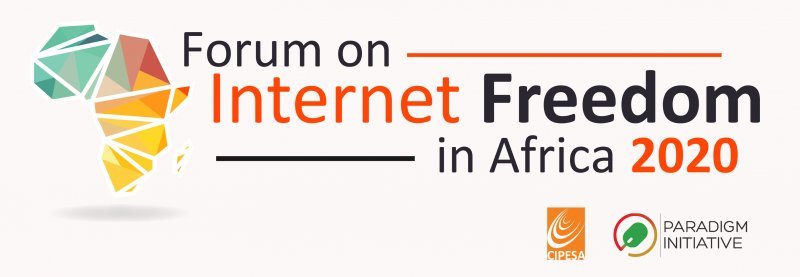FIFAfrica20 |
Day 1: Monday, 28 September 2020
The Forum on Internet Freedom in Africa 2020 (FIFAfrica20) kicks off on Monday, 28 September 2020 which is also the International Day for Universal Access To Information (IDUAI). An opening panel of key actors in Africa’s digital landscape will explore the digital opportunities amidst the ongoing Covid-19 pandemic and implications on digital rights. The opening panel lineup includes Simon Allison, who in the midst of Covid-19 launched the Award-winning weekly publication The Continent, which introduced a unique disruption to journalism through its use of Whatsapp as a distribution platform.
Techprenuer and founder of the global enterprise application solutions provider AppsTech, Rebecca Enonchong will also share insights on some of the interesting digital shifts in Africa that have emerged in the wake of Covid-19. She will also reflect on the prevailing technology landscape and where we could potentially be heading as a continent.
For more on the Forums including past events, visit: www.internetfreedom.africa
The African Freedom of Expression Exchange (AFEX) will host a session on data protection and privacy concerns in the fight against Covid-19 which will highlight some of the rushed Covid-19 related laws that emerged and their implications on freedom of expression, access to information and digital rights. The session will aim to make recommendations to civil society and other actors on how to advocate for the laws to be repealed or in some cases amended.
As strategic litigation continues to gain prominence as a tool for pushing back against regressive digital rights policy and practice in Africa, the Catalysts for Collaboration (C for C) have become a key resource for best practices and case studies on collaborating across disciplines in strategic litigation to advance digital rights. In 2017, the first version of the Catalysts for Collaboration was presented at FIFAfrica in Johanessburg, South Africa. Since then, the Catalysts have informed multiple training and learning sessions, including at FIFAfrica18 in Accra, Ghana and FIFAfrica19 in Addis Ababa, Ethiopia.
In response to numerous requests, the Catalysts have now been translated from English into French, Spanish and Russian, making them accessible to a wider audience. At FIFAfrica20, the new C for C website will be formally launched. Lawyers, activists and others involved in some of the case studies will briefly present some of their learnings in collaborative strategic litigation projects, followed by an interactive discussion.
As part of an ongoing project, the Center for Digital Resilience (CDR) is supporting civil society to crowdsource and understand disinformation within communities. In a session titled What the world needs now is a way to crowdsource the fight against disinformation, the CDR will introduce the FIFAfrica20 audience to Waterbear – a suite of tools that makes it easy to gather, analyse, and access data needed to expose disinformation patterns. The session will also share relevant disinformation resources from global partners, such as a 101 toolkit for NGOs/CSOs, and a roadmap for the civil society sector’s efforts to detect and respond to online manipulation.
Meanwhile, the rapid expansion of digital technologies across the globe has profoundly transformed the way in which citizens engage with one another. Yet, beyond the attractive benefits of many of these new tools are hidden costs and broader implications for digital rights that must be considered. The adoption of certain technologies may impede digital rights, such as issues relating to data protection or built-in mechanisms that allow unethical surveillance of citizens. As new technologies continue to be introduced across Africa, it is crucial that governments and citizens alike closely examine the risks and digital rights considerations for all new technologies. The Center for International Private Enterprise (CIPE) will host a session titled Buyer Beware: Understanding Implications of Technology for Digital Rights that will examine the primary considerations and risks that citizens should be aware of when it comes to adopting new technologies; actions that governments should take to protect the data of their citizens; and how international norms and standards can help governments and technology companies ensure that new technologies are deployed in a way that respects digital rights.
Similarly, the Global Network Initiative (GNI) will explore Trends in Content Regulation in Africa and Beyond based on a recent study conducted over a dozen governmental initiatives on Content Regulation & Human Rights.
Day one of the forum will also feature two skills-building sessions. Virtually, CIPESA, in partnership with CIPE and Data4Change will host a Data Skills Foundation Course which will introduce participants to a 4-step data workflow. Through practical exercises and interactive quizzes, students will learn how to source secondary data through online research, how to format data and perform basic calculations using Google spreadsheets and how to create a simple data visualization suitable for publication on social media. The course will conclude with an assignment for each participant to write and pitch an idea for a data-driven project at their organisation. Secondly, at a remote hub in Kinshasa, Democratic Republic of Congo, the Digital Security Group will be upskilling investigative journalists and human rights activists in risk assessment and digital security.
Lastly, look out for the daily Digital Security Hub, featuring multi-lingual (English, French and Arabic) tech security experts from across the continent, on hand to provide personal and organisation digital security support. You can find them in the exhibitor center or through the chat widget on the internetfreedom.africa website. The Digital Security Hub is a collaboration of DefendDefenders, Defenders Protection Initiative, Access Now, Greenhost, Digital Society of Africa, and the Digital Security Alliance.

